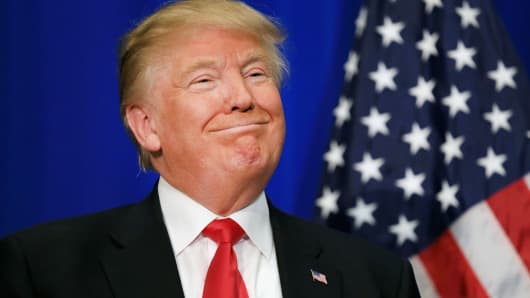
GDP growth in the past year was 2.9%, steadily increasing since the recession. Ever since Trump took office, job, workforce and productivity growth had slowed, which predictably will cause the 2018 GDP to be lower than the years preceding it. With the baby boomers retiring, the workforce will see a steady decrease. And like O’Brien, a reporter covering economic affairs, had stated, “it won’t get better anytime soon when Trump is demanding that we reduce our easiest source of new workers: legal immigrants”.
While Trump’s tax cuts do increase investments in machines and technology that will bring an increase in productivity, I believe this will lead to a upward trend in unemployment rate. More efficient machines equals less of a use for human employees. So I believe the pros and cons will cancel each other out and will not benefit GDP in the long run.
While Trump’s tax cuts do increase investments in machines and technology that will bring an increase in productivity, I believe this will lead to a upward trend in unemployment rate. More efficient machines equals less of a use for human employees. So I believe the pros and cons will cancel each other out and will not benefit GDP in the long run.
Do you think Trump’s tax cuts will increase growth in the long run? Or just short term or not at all? What do you think will become of GDP in a few years? What effect do you think the tax cuts will have in the long term?
5 comments:
I definitely believe that tax cuts in general will definitely help boost GDP and perhaps productivity in the short run, but may also cause an unneeded increase in inflation. Also, the tax cuts will eventually turn around and start to only benefit the rich; personally, I'm not too big of a believer in trickle-down economics. The economy as a whole may grow, but I only see the gap between lower- and higher-income earners continuing to increase.
Chris is right on the money (haha, geddit?) with his comments on GDP. Most of the time, tax cuts do benefit GDP and the economy-but this is not one of these times. When policymakers cut taxes, they need to cut taxes where there's the most potential for economic growth-and that potential growth is in small and main street businesses, as well as the middle- and lower-class tax brackets and those aforementioned legal immigrants. I'm not to worried about inflation-the federal reserve can raise interest rates accordingly, which is probably good for those with savings accounts. But economic investment with the upper class in the form of tax brackets will yield a poor return for the rest of the country, and that's the issue with the majority of most tax reform in American politics.
I personally don't think that tax cuts are the answer to boosting our GDP. I think that the tax cuts may stimulate the economy in the short run but I doubt they will have much impact in the long run. It also definitely wasn't the smartest move in respect to our staggering amount of national debt that will just keep piling up now that our government spending keeps increasing and taxes have just been cut.
I don't think that Trump's tax cuts are going to slow down the economy. Granted, I doubt that his new tax structure will be around too much longer after 2022, but it is hard to deny that cutting taxes on big business will decrease GDP in the long run. With fewer taxes, businesses don't just buy new capital, they also invest in more workers, providing jobs and increasing production. By definition, cutting back regulations increases the profitability/production of businesses, which will increase GDP and decrease unemployment, albeit with high externalized costs.
*it is hard to deny that cutting taxes on big business will increase GDP
Post a Comment